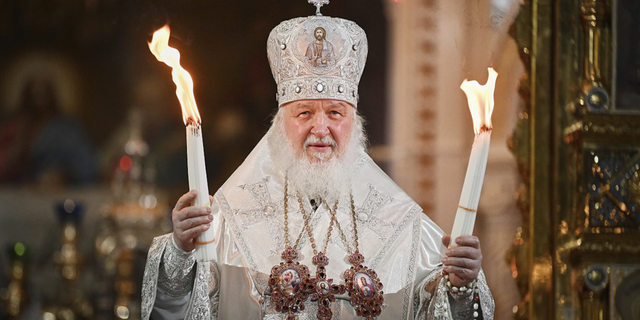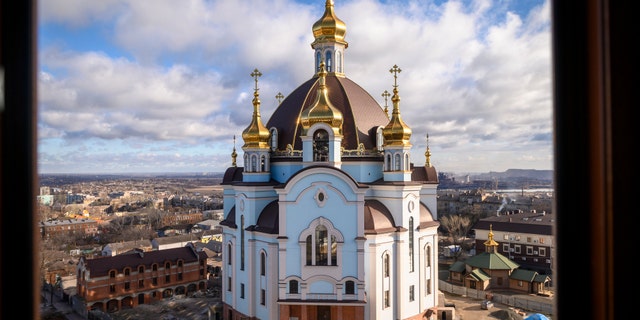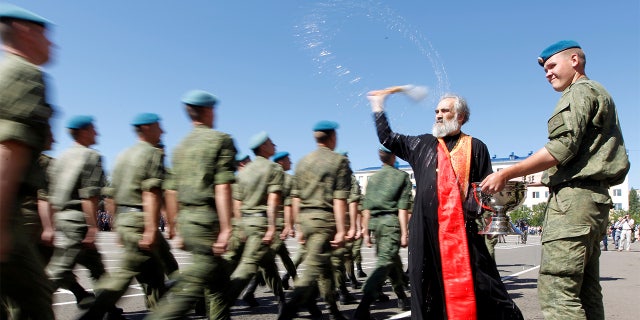Ukrainian President Volodymyr Zelenskyy announced that his government will impose limitations on religious organizations that have links to Russia in an effort to tighten up national security.
“The National Security and Defense Council has instructed the government to propose to [parliament] a bill on proscribing activities in Ukraine by religious organizations affiliated with centers of influence in Russia,” Zelenskyy said, according to the AFP.
“National security officials should intensify measures to identify and counteract the subversive activities of the Russian special services in the religious space in Ukraine.”
Ukraine has followed Moscow’s spiritual leadership for centuries, but the Russian Orthodox Church’s role in the war forced many to take a more critical look at the institution.
PUTIN OPEN TO UKRAINE TALKS AFTER BIDEN SIGNALS WILLINGNESS IF RUSSIA SERIOUS ABOUT ENDING WAR
Patriarch Kirill, the leader of Russia’s Orthodox Church, has remained a vocal supporter and ally of Russian President Vladimir Putin during the invasion of Ukraine.
In this photo provided by the Ukrainian Presidential Press Office on Saturday, June 18, 2022, Ukrainian President Volodymyr Zelenskyy attends meeting with military officials as he visits the war-hit Mykolaiv region.
(Ukrainian Presidential Press Office via AP)
Kirill has made statements to help maintain morale and support for the war, such as assuring Russian soldiers that they will have their sins absolved if they die in the line of duty and that God mandated Putin’s rule.
“We need to be very strong,” Kirill said April as he blessed the troops ahead of their Ukraine service. “When I say ‘we,’ I mean the armed forces first and foremost.”
UKRAINIAN EMBASSIES, CONSULATES IN 6 EUROPEAN NATIONS RECEIVE PACKAGES CONTAINING ANIMALS’ EYES
The patriarch’s actions have prompted some to even call him “a small copy of Putin” who “lives the life like the oligarchs live.”
Rebekah Koffler, president of Doctrine & Strategy Consulting and a former Defense Intelligence Agency officer, said that Zelenskyy’s move to restrict the church is unsurprising, since it is a move out of the Russian playbook to control information. KGB agents heavily infiltrated the church during the Soviet Union in order to use religion as a “weapon against political opposition.”

Russian Orthodox Church Patriarch Kirill conducts the Easter service at the Christ the Savior Cathedral in Moscow on Saturday, April 23.
(Sergei Vlasov, Russian Orthodox Church Press Service via AP)
“Back during these service days, the KGB penetrated the church at large and would use it to basically identify any kind of dissent, any kind of opposition,” Koffler explained, calling it a form of statecraft.
“They would strike up relationships with priests, and the priests basically would report to the KGB on anyone who was perceived as disloyal to Soviet authorities, because when a person comes to confess, they tell them their views.”
UKRAINE REVEALS STAGGERING COST OF RUSSIAN WAR: UP TO 13,000 SOLDIERS DEAD
Koffler said the Ukrainian security services have gone into churches affiliated with the Russian Orthodox Church and conducted raids to interrogate priests and arrest them on suspicion of providing information to Russia.
“On the one hand, Zelenskyy is trying to prevent what he perceives as the spread of Russian influence within Ukraine,” Koffler said. “But he is using Soviet KGB tactics to do that.”

The Church of the Intercession of the Mother of God in Mariupol, Ukraine.
(Christopher Occhicone/Bloomberg via Getty Images)
Zelenskyy has waited to execute this move, because it was something of a last resort as Russia hits Ukraine’s infrastructure harder, and he faces pressure to end the war.
RUSSIA ACCUSES US OF ‘DIRECT’ PARTICIPATION IN UKRAINE WAR, BUT LAVROV OPEN TO TALKS

An Orthodox priest blesses Russian paratroopers marching during 2017 Paratroopers’ Day celebrations, the annual holiday of Russian Airborne Troops, at their military unit in the southern city of Stavropol, Russia.
(REUTERS/Eduard Korniyenko TPX IMAGES OF THE DAY)
“He’s just trying to figure out what to do, because it is everything else seems to not translate into victory for Ukraine or for Russia at that point,” Koffler said, adding that “we’re at a stalemate” between the two countries, and the war is “ultimately unwinnable for many, many reasons.”
The move also presents the latest step in Zelenskyy’s effort to limit Russian influence in his country, which he started to remove even before Putin’s invasion, when he passed a law making Ukrainian the country’s official language over Russian.
CLICK HERE TO GET THE FOX NEWS APP
“He’s trying to preserve his country’s sovereignty, but the bottom line is that it’s a very complicated issue,” Koffler concluded. “Russia and Ukraine history intertwined for centuries, including religion, and now [Zelenskyy] is using the same tactics to suppress Russian Orthodox religion within Ukraine, just like the Soviet KGB did.”